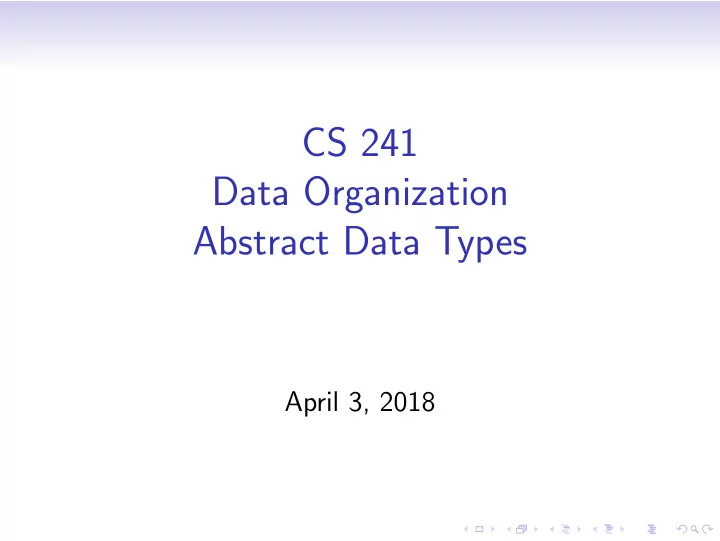

CS 241 Data Organization Abstract Data Types April 3, 2018
Abstract Data Types • List – sequence • Set – no duplicates • Queue – First In, First Out (FIFO) • Stack – Last In, First Out (LIFO) • Priority Queue – Highest priority first • Map – associates keys with values (some languages call it a dictionary )
Implementation • Arrays • Linked Lists • Trees • Hash tables
Priority Queue • Could implement same as stack or queue, using linked list with ordered elements • Don’t necessarily care about total order, so could use a heap.
Map • For small maps, may make sense to just use a linked list of key,value pairs. • If keys are restricted to small range of integers, may just use an array. (Value for key k is at A[k].) • Binary search tree (see K & R 6.5) • Hash Table (see K & R 6.6)
Hash Table The entries in a hash table are distributed across an array of buckets . In this figure we use a linked list to hold the entries in each bucket. key key value value NULL NULL key NULL value NULL NULL
Hash Function • Given a particular key, compute an index for the bucket where it will be stored. • Often done in two steps 1. Compute integer hash value for key using some hashing function. 2. Find index using hash % array size • Good hash function uniformly distributes keys across the table, reducing collisions . • Perfect hash function would have no collisions. Can be created if keys are known in advance.
Table structure struct TableEntry { char* key; int value; struct TableEntry* next; }; #define HASHSIZE 101 struct TableEntry* hashTable[HASHSIZE ];
Hash function unsigned int hash(char* s) { unsigned int hashval; for(hashval = 0; *s != ’\0’; s++) { hashval = *s + 31 * hashval; } return hashval % HASHSIZE; }
Lookup struct TableEntry* lookup(char* s) { struct TableEntry* entry = hashTable[hash(s)]; while(entry != NULL) { if(strcmp(s, entry ->key) == 0) { return entry; } entry = entry ->next; } return NULL; }
Recommend
More recommend